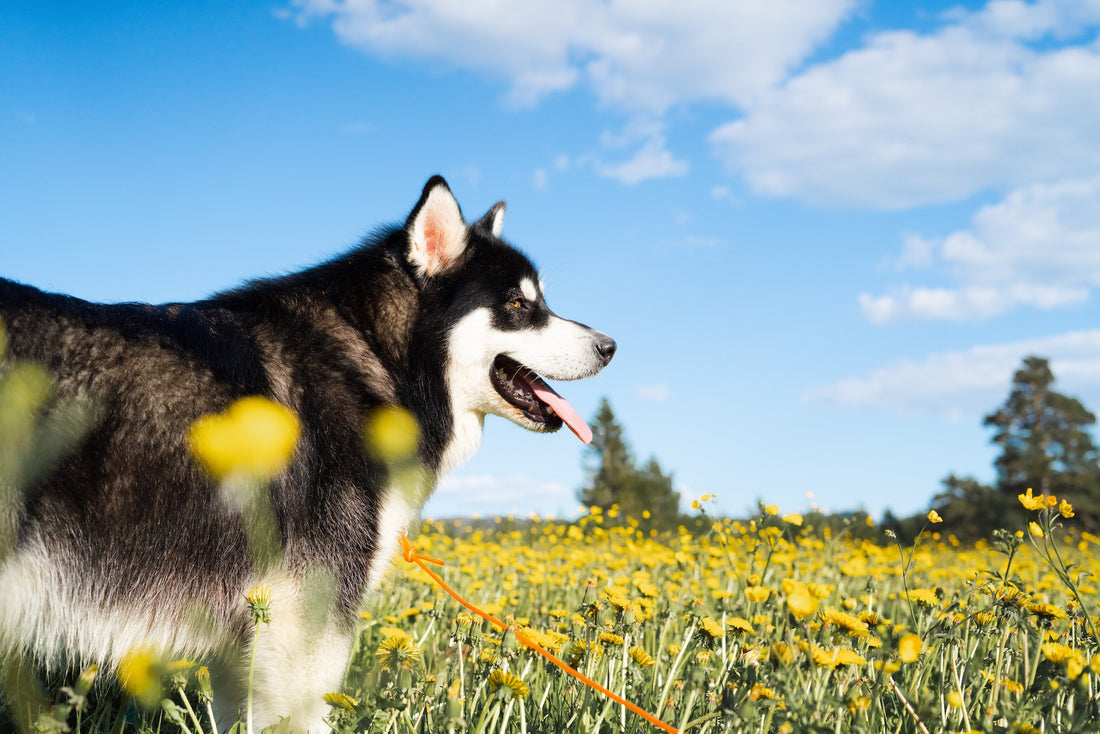Does your dog have allergies?
Dogs can suffer from the same type of allergies as people, including food and seasonal allergies.
Seasonal Allergies in Dogs
Seasonal allergies are fairly common in dogs, with spring, summer and fall being when symptoms are most prevalent.
Spring and summer allergies are caused by excess pollen in the air, while fall allergies are due to the presence of mold spurs. Both may exacerbate symptoms in dogs with known allergies, as well as be a trigger for the sudden onset of allergies in dogs that have not previously suffered from any prior allergic reactions.
Seasonal Allergy Symptoms in Dogs
Scratching
This is a clear sign that your dog is feeling itchy. They may also nibble and bite at their skin to alleviate the itchiness.
Licking
Excessive and compulsive licking is another behavior dogs may exhibit when they are suffering from allergies.
Skin Irritation
If your dog is scratching and/or licking repeatedly, they may develop skin irritations such as redness, inflammation and hot spots.
Shedding and Hair Loss
Excessive shedding and hair loss can occur when a dog is suffering from allergies. Compulsive scratching and licking can cause inflammation and irritation of the skin which can then affect the hair follicles, leading to hair loss.
Respiratory difficulties
This can include sneezing, coughing, wheezing, and even difficulty breathing.
Eyes and Ears
Allergies can cause your dog to have red, swollen eyes, sometimes containing discharge. They can also lead to itchy ears and ear infections. Dogs will often paw at their eyes when they are experiencing itchiness from allergies, and shake their heads if their ears are itchy, inflamed or infected.
Treating and Reducing Seasonal Allergy Symptoms in Dogs
Supplements
Stop the Itch! Adding specially formulated supplements can provide soothing relief from allergy related skin issues.
Allergy and Itch Chews for Dogs combines all-natural ingredients that work together to promote a normal immune response to allergens while reducing allergy-related symptoms.

Krill, fish oil, and flaxseed are all high in omegas to reduce inflammation and fight itchiness, while kelp adds essential vitamins, minerals, and amino acids. Probiotics support normal digestion, and biotin promotes healthy skin and coat.
Boost Immune Health: Many of us do not realize the importance gut health plays in promoting a healthy immune system. That’s where probiotics come in. Probiotics work to support and balance gut health for optimal digestion, which is essential for maintaining a healthy immune response to allergens. Adding probiotics to your dog’s diet is a great way to reduce, and even prevent allergy symptoms.
Allergy Medication: Dogs can benefit from the same medications people use to prevent, suppress, and alleviate symptoms from an allergic reaction. Some dogs may be prescribed a regiment of steroids. Consult your veterinarian for information and proper dosage.
A Healthy Diet: A nutrient rich kibble that’s high in omega fatty acids and contains probiotics can be very helpful for dogs that suffer from any type of allergy.
Bathing: Removing pollen from your dog’s coat after being outside can make a big difference. Depending on your dog, this can be done with a quick bath or hose off, or by wiping their coat down with some hypoallergenic wipes, even a simple towel will help remove some of the allergens.

Skin Health: If your dog has a hot spot, or irritated skin due to their allergies, using a topical spray will help to reduce inflammation, itchiness, and promote healing.
Food Allergies in Dogs
First, it’s important to note, that just like people, dogs can have an “intolerance” to a food, but not be “allergic” to it.
Food Allergy or Food Intolerance, What’s the Difference?
Food Allergies: An allergic reaction to a food occurs when a dog’s immune system overreacts to a protein, identifying it as dangerous, even if it’s perfectly healthy. When this happens, the body triggers a response that produces antibodies to fight it.
The Top Food Allergies in Dogs Include:
- Beef
- Dairy
- Chicken
- Soy
- Wheat
Some of the symptoms of food allergies in dogs are nearly identical to seasonal allergies. They typically suffer from itchiness, excessive scratching, rashes, hot spots, head shaking, paw licking and more.
Food Intolerance in Dogs
Food intolerance in dogs may present with similar symptoms as food and seasonal allergies, however, there is an easy way to differentiate between them.
Food intolerance causes digestive upset, including vomiting and diarrhea.
Treating Food Allergies and Intolerance
The first step is to figure out what is causing the problem, and whether it’s a food intolerance or a true food allergy.
Consult your veterinarian and have basic blood work done. There are also allergy tests available for dogs. Your vet may also suggest trying an elimination diet to determine the cause.
Whether due to environmental factors, or diet, addressing and properly treating your dog’s allergies can significantly reduce symptoms, impacting both their overall health, and quality of life.
Products related to this article:
- Allergy and Itch Chews for Dogs
- Probiotic Soft Chews for Dogs
- Probiotic and Bone Broth Kibble for Dogs
- Antimicrobial Wound and Skin Care Spray for Dogs
Every Sale Supports a Shelter Pet. Learn More.
Created in Vermont. Learn More.
If you suspect your pet is sick, call your vet immediately. For health-related questions, always consult your veterinarian, as they have examined your pet, know the pet's health history, and can make the best recommendations for your pet.




